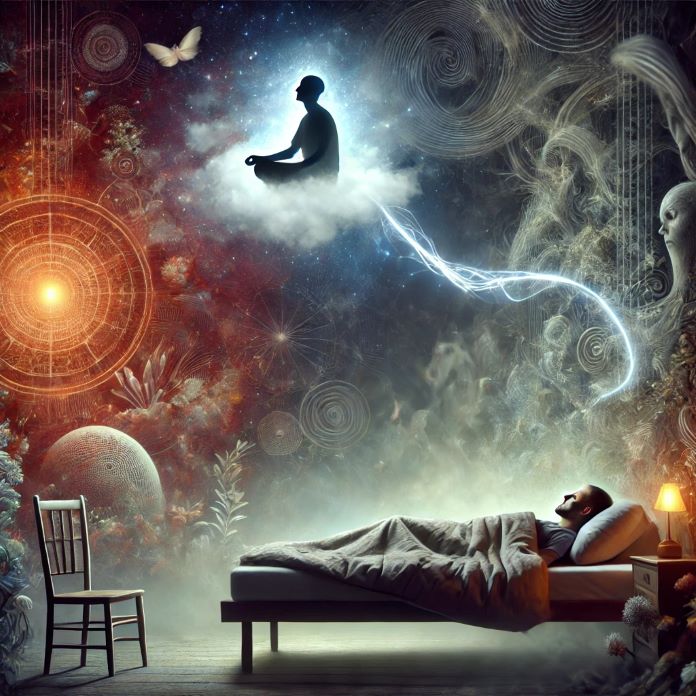Lucid Dreaming Mask – Improve the Quality of Your Practices
Lucid Dreaming App – Dream Diary, Social Network and Monitoring of Your Dreams
When a person enters a lucid dream, the realism of the environment can be astonishing. It’s often hard to believe that everything is just a dream. However, when unsettling events or characters appear in a dream, questions arise: Is lucid dreaming dangerous? Can a lucid dream influence the material world of the dreamer?
It’s no surprise that people begin searching for answers to the troubling question of why lucid dreaming might be dangerous, even though there seems to be no immediate threat at first glance. In fact, many wonder about the dangers of lucid dreaming and whether it’s a harmless mental adventure or something more serious.
While searching for an answer to this question, you may come across the term “out-of-body experience“. This phrase is often taken literally. Some people believe that while dreaming, a subtle part of the human self — or the “soul,” according to some interpretations — leaves the body and travels to other worlds.
But what if this “soul” gets lost in these unknown realms and can’t “return”? Would the person die?
And what would happen to the body if, while the “soul” is off exploring, another entity, maybe even a foreign “soul,” takes over? Would the person become someone else? Is that possible?
After reading various myths, some people start practicing lucid dreaming solely to control their dream journeys and avoid the dangerous consequences of uncontrolled “out-of-body” experiences. These concerns highlight just how seriously some people take the dangers of lucid dreaming, despite the lack of scientific consensus.
Regardless of these diverse fears and invented stories, no scientific studies have confirmed or denied these claims. Although this may not bring comfort to those searching for answers online, we can speak with some certainty about the fears that arise in lucid dreams.
Lucid dreams, especially when they occur rarely, can evoke a wide range of emotions. Often, it’s not the dreams themselves that are dangerous but the experiences — and, particularly, the fears — connected to them. So if you’re wondering, are lucid dreams dangerous, the truth is more nuanced than the myths suggest.
You can read more about this in Michael Raduga’s book The Phase. But for now, let’s explore the common fears that arise among people who accidentally enter lucid dreams and those who begin practicing them intentionally.
Death in a Lucid Dream
The experiences and sensations in a lucid dream can be so vivid and realistic that when someone faces a catastrophe, they may genuinely fear that their trauma or death will “materialize” in the real world. This is why many beginners ask, “What is lucid dreaming, and what is dangerous about it?”
But there’s no need to worry about dramatic events in dreams. It is well-known that death and other critical events in both regular and lucid dreams usually lead to immediate awakening. The actual end of life depends on the person’s health and other physical factors. There is no evidence to suggest that lucid dreams can cause death.
Leaving the Body and Not Returning
Stories about “out-of-body experiences,” traveling to other worlds, and so-called “astral projections” are common. However, again, no scientific studies have confirmed or denied these claims. Therefore, these concerns can be considered more as speculative fiction than serious scientific assertions.
Someone Else Entering the Body
In many cases, people fear that something will enter their body while they are having a lucid dream. This case is similar to the previous one. It’s worth adding, however, that any intense emotional experience, such as a shock from an unsettling or frightening event in a dream — like the perceived “loss of the body” — usually leads to immediate awakening. Therefore, the idea of “losing” your body due to “astral travel” is highly unlikely. The “soul” is bound to the body by much stronger ties than anyone who believes esoteric teachings might imagine.
That said, experiencing fear in a dream can trigger a perfectly normal physical reaction to a sudden, dangerous stimulus. An accelerated heartbeat, tense muscles (as if the person were ready to flee), sweating, and other symptoms of fright or panic closely mirror what one might feel in real life and seem just as tangible as in the material world. In this case, the simple realization that the source of fear was just a dream brings great relief and leads to a sense of calm.
Those who practice lucid dreaming regularly have an excellent opportunity to confront their fears while dreaming and prevent unnecessary psychological or physical distress.
More detailed techniques on how to work through your fears in controlled dreams can be found in Michael Raduga’s book REM Psychology. But, for now, it’s enough to know that you can use the fear of “losing your body” to better manage your dreams and resolve psychological issues in the dream state.
Physical Danger
Real danger could arise if a person becomes so obsessed with lucid dreaming that they attempt to induce the state every chance they get, ignoring their body’s needs and the demands of real life.
This happens when someone tries to force themselves to fall asleep and enter a lucid dream whenever they can. This behavior disrupts the body’s natural biological rhythms and damages the person’s health.
It becomes even more harmful when people start using alcohol or various dangerous narcotics and psychoactive substances in pursuit of lucid dreaming. Although such substances might initially bring about seemingly vivid visions, in the long term, they suppress the nervous system and can lead to an inability to control dreams.
In such cases, it’s not the lucid dream itself that poses a physical danger but the individual’s behavior. By willfully using imagined “doping” to achieve temporary, artificial results, the person ultimately harms their health, and the lucid dreams turn into distorted fantasies that have nothing to do with true lucid dreaming.
Psychological Danger
Lucid dreaming can become dangerous if a person becomes so absorbed in the practice that they want to avoid real-life events and fully immerse themselves in the dream world. This can lead to social isolation, irritability, frustration, and disappointment if the ability to control dreams fades over time, which often happens when people neglect their physical and psychological well-being in real life.
It’s important to remember that the healthier and stronger your body is, the more diverse impressions and emotions you will gain from interacting with real people in the material world; moreover, the more vivid and joyful your waking life, the better your lucid dreaming practice will be. Therefore, the psychological danger of lucid dreaming exists only if a person neglects their real life and physical body and lives solely for the practice of lucid dreaming.
Lucid dreaming can bring many positive emotions if you practice it without excessive fanaticism, if you strengthen your body and health, and if you actively engage in real life. For help with learning the practice of lucid dreaming, try Michael Raduga’s free nine-hour video course, Complete Course on Lucid Dreaming from Beginner to Expert.
FAQ
Recommended reading
How to learn to have lucid dreams
Are lucid dreams real and how to learn to be aware of them









